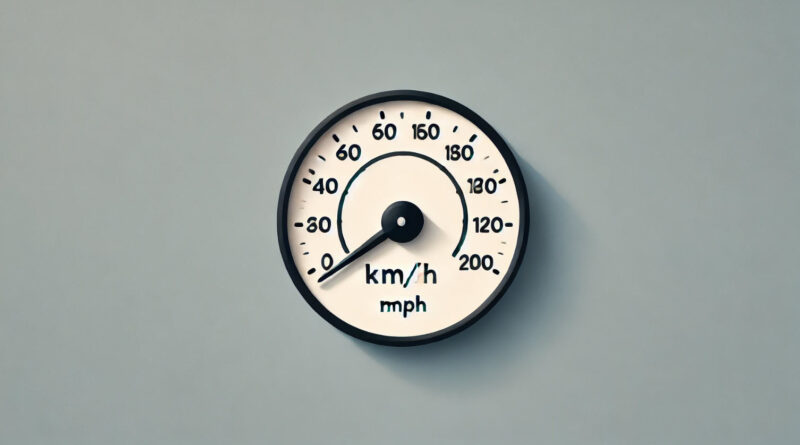What Is a Speedometer, and Why Does It Matter?
But how does speedometer actually work, and why is it so important? Let’s break it down in a way that makes sense. Ever glanced at your car’s dashboard and noticed that little gauge telling you how fast you’re going? That’s the speedometer, and it’s one of the most important tools in your car. It helps you keep track of your speed, making sure you stay within limits, drive safely, and avoid unnecessary fines.
What Exactly Is a Speedometer?
A speedometer is the device that tells you how fast your car is moving. It measures your speed and displays it in either miles per hour (MPH) or kilometers per hour (km/h), depending on where you are in the world.
It’s a crucial tool that helps you adjust your speed to match road conditions, stick to speed limits, and stay in control of your car.
How Does a Speedometer Work?
Speedometers can work in two main ways—mechanically or electronically. Here’s a quick explanation:
1. Mechanical Speedometers
- In older cars, a cable connected to the car’s transmission spins as the wheels turn.
- This spinning motion drives the needle on the speedometer dial, showing how fast you’re going.
2. Electronic Speedometers
- Most modern cars use sensors to measure wheel or transmission speed.
- These sensors send data to your car’s computer, which calculates your speed and displays it either on a digital screen or with a moving needle.
Both systems are designed to give you real-time updates on your speed as you drive.
Why Is a Speedometer So Important?
You might not think much about your speedometer, but it plays a vital role in your everyday driving. Here’s why it matters:
1. Keeps You Legal
Speed limits exist to keep roads safe, and your speedometer helps you stick to them. It’s your first line of defense against speeding tickets and fines.
2. Helps You Drive Safely
Knowing how fast you’re going allows you to adjust your speed based on weather, traffic, or road conditions, keeping you and others safe.
3. Prevents Damage to Your Car
Driving too fast can strain your engine, brakes, and tires. Your speedometer helps you keep things in check.
4. Improves Fuel Efficiency
Driving at a steady, optimal speed is better for your wallet. Keeping an eye on your speedometer can help you save fuel.
Different Types of Speedometers
Not all speedometers are the same. Here are the most common types you’ll find in cars:
1. Analog Speedometers
These are the classic ones with a needle that moves across a numbered dial. They’re simple, reliable, and easy to read.
2. Digital Speedometers
Digital speedometers show your speed as a numerical value on a screen. They’re common in modern cars and are super precise.
3. GPS-Based Speedometers
These use satellite signals to calculate your speed. They’re often found in smartphone apps or aftermarket devices and are known for their accuracy.
Speedometer vs. Odometer: What’s the Difference?
While the speedometer tells you how fast you’re going, the odometer tracks how far you’ve traveled. Here’s a simple comparison:
| Feature | Speedometer | Odometer |
|---|---|---|
| What It Measures | Current speed (MPH or km/h) | Total distance traveled (miles or kilometers) |
| Purpose | Helps you drive safely | Tracks mileage for maintenance and resale |
Signs Your Speedometer Might Be Faulty
A faulty speedometer can cause some headaches. Here are a few signs that it might not be working properly:
- Erratic Needle Movement: The needle jumps around or doesn’t move smoothly.
- Inaccurate Readings: Your speedometer shows the wrong speed compared to your actual driving speed.
- No Response: The needle stays stuck, or the digital display doesn’t show anything.
If you notice any of these issues, it’s a good idea to get it checked out by a mechanic.
How to Take Care of Your Speedometer
Keeping your speedometer in good shape is pretty straightforward. Here are a few tips:
- Inspect Regularly: Check the speedometer’s functionality during routine maintenance.
- Fix Wiring Issues: For mechanical speedometers, make sure the cable is intact. For electronic ones, ensure the sensors are working properly.
- Act on Warning Signs: If your speedometer starts acting up, don’t ignore it. Get it inspected before it causes bigger problems.
Do GPS Speedometers Have an Edge?
GPS speedometers are becoming a popular alternative to traditional systems. They calculate speed using satellite signals, which means they’re not affected by issues like tire size or drivetrain problems. They’re often used as a backup or in vehicles without built-in speedometers.
Why Every Driver Needs a Speedometer
Whether you’re a seasoned driver or a newbie, the speedometer is an essential tool. It keeps you informed, helps you drive more efficiently, and ensures you’re following the rules of the road. From preventing speeding tickets to improving safety, it’s one of the most important features in your car.
Final Thoughts
The speedometer might seem like just another gauge on your dashboard, but it’s a critical part of your driving experience. It helps you stay safe, save money on fuel, and keep your car in good shape.
So, the next time you glance at your speedometer, remember—it’s more than just a needle or a number. It’s your key to safer, smarter, and more responsible driving.
Buying a used VW. Buying used vauxhall, BMW, Jaguar, Ford, Volvo, Range rover, Bentley, Aston Martin, Porsche, Ferrari, Lamborghini, Maserati, Hyundai, Tesla, Honda, Pagani

